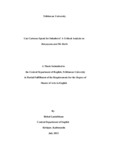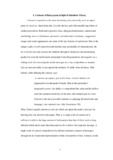Please use this identifier to cite or link to this item:
https://elibrary.tucl.edu.np/handle/123456789/2862Full metadata record
| DC Field | Value | Language |
|---|---|---|
| dc.contributor.author | Lamichhane, Bishal | |
| dc.date.accessioned | 2021-03-02T05:58:36Z | |
| dc.date.accessioned | 2021-07-23T04:22:37Z | - |
| dc.date.available | 2021-03-02T05:58:36Z | |
| dc.date.available | 2021-07-23T04:22:37Z | - |
| dc.date.issued | 2012-07 | |
| dc.identifier.uri | http://elibrary.tucl.edu.np/handle/123456789/2862 | - |
| dc.description.abstract | Cartoon is the most significant and effective form of visual art. It can capture the attention of people from all status. Satiric in tone, humorous in nature, pictorial representation are some the key feathers of cartoon art. Moreover it is sharp, vibrant and direct. It is also said that cartoon is a unique art of disapproval and complaint. By using biting images and humorous contents, it makes strong commentary on social and political events. As a mass art, cartoons, whether social or political, speak in favor of majority public and expose the erroneous ills and evils of society with humorous touch. Despite being humorous in nature, it chooses the highly serious issues and problem, particularly faced by innocent public, and exposes them by the means of pictorial representation, which is generally done through the technique of parody, imitation and caricature. Cartoon as a symbolic sword, resists and attacks the autocratic authority thereby subverting state’s power of domination. And it also provides the voice to those voiceless subalterns who have to suffer a lot due to the hegemonic power of ruling class, bourgeoisie and repressive power politics. Therefore, this research highlights that cartoon art, as a subaltern art, not only deconstructs the hegemonic power structure by means of satire, irony, paradox etc., but it also gives the space for those muted subalterns by providing them agency so as to raise the voice of protest and objection. | en_US |
| dc.language.iso | en_US | en_US |
| dc.publisher | Faculty of Humanities and Social Sciences of english | en_US |
| dc.subject | Batsyayana and His Barbs | en_US |
| dc.subject | Critical Analysis | en_US |
| dc.subject | Cartoons Speak | en_US |
| dc.title | Can Cartoons Speak for Subaltern? A Critical Analysis on Batsyayana and His Barbs | en_US |
| dc.type | Thesis | en_US |
| Appears in Collections: | English | |
Files in This Item:
| File | Description | Size | Format | |
|---|---|---|---|---|
| COVER (1).pdf | 340.46 kB | Adobe PDF |  View/Open | |
| CHAPTER.pdf | 1.87 MB | Adobe PDF |  View/Open |
Items in DSpace are protected by copyright, with all rights reserved, unless otherwise indicated.
